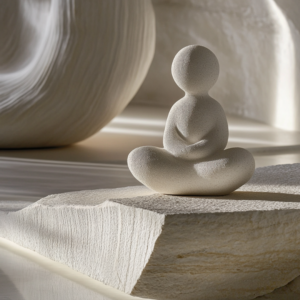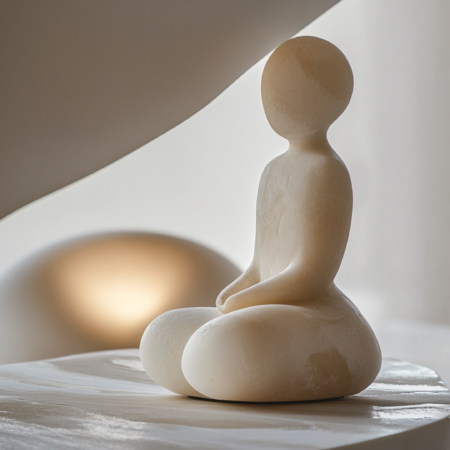When security and insecurity meet, the clash isn’t always loud, it’s often quiet, subtle, and deeply felt. Some conflicts don’t come from loud arguments or dramatic fallouts. Sometimes, it’s the quiet tension between a person who has done the work to heal and one who hasn’t. A person who walks with confidence, grounded in self-awareness and one who is still looking for validation and whose emotions are still triggered by wounds unhealed.
We live in a world that applauds healing but rarely speaks to what happens when the healed and unhealed try to coexist in close proximity. Whether it’s a friendship, a romantic relationship, or even a professional connection, when a secure soul meets an insecure one, it doesn’t take long for the ground to shake.
I recently told a friend, who felt the burden and responsibility of loving someone through their despair, “You didn’t plant the seed of someone else’s insecurity. You just happened to walk through the garden where it grew.” And in no way was she responsible for pulling out the weeds that’s been preventing them from growing forward.
Let’s talk about what really happens when a confident person and someone who’s still struggling with their self-worth try to build a relationship. It’s not always easy and it often comes with emotional tension and unwanted conflict. Can the insecure and secure co-exists? I have my opinion, but would love to know what you think after you read this blog.
What Security Looks Like
A secure person is rooted. You can hear it in their voice that comes across calm, assured, clear. You can see it in their posture as they walk through life upright, confident, at ease. They aren’t easily threatened by other people’s success or energy because they know who they are. Their validation comes from within. They’ve done the inner work, asked the hard questions, had the hard conversations, faced the hard truths, and came out stronger on the other side.
Secure people don’t need to be the loudest in the room because they’re confident in their silence. They don’t need to outshine others to feel seen because their light is consistent. Not flashy…Consistent.
And yet, because of this security, they often feel compelled to help. To pour into those who don’t yet see their worth. To become a bridge of healing wanting to help others get to the other side where they can see their own light.
But here’s the thing my friend…
What Secure People Must Remember
Loving someone through their pain or insecurities may seem noble, even Christlike, but there’s a fine line between compassion and codependency. I remember taking on the emotional weight of someone else’s healing, believing that my love wrapped in grace, tolerance, and understanding, would be enough to soothe their wounds. I gave softness when life had hardened them. I offered safety when the world felt unsafe.
But what I didn’t realize then is that some wounds aren’t yours to bandage. And when someone refuses to acknowledge their brokenness, that brokenness behaves like shattered glass and it cuts.
And if you’re the one standing too close, you bleed. Sometimes leaving you with several scars that now have you feeling wounded as well.
I’ve learned that while love is patient and kind, as 1 Corinthians 13 reminds us, it does not insist on its own way. True love honors boundaries and respects process. I confused sacrificial love with spiritual responsibility, and in doing so, I interfered with what may have been God’s divine correction and invitation to their growth.
Sometimes, what looks like a crisis is really God’s call to deeper transformation. And sometimes, when you step in prematurely to rescue someone from what God is trying to reveal, you become an unintentional barrier to their breakthrough.
Healing is holy work, sacred and personal. And it is not our role to interrupt it just because we want to see someone whole. That’s God’s territory.
I learned the hard way that someone else’s tribulations were not mine to carry. I learned that being “the strong one” does not mean sacrificing my peace for someone else’s potential. I learned that grace doesn’t mean self-abandonment.
And most of all, I learned that God doesn’t need me to play the Savior, He already sent one.
You Cannot Heal What Doesn’t Want to Be Whole
 Secure people often become emotional fixers. They see potential and want to nurture it. But potential without accountability becomes an emotional burden, one you were never meant to carry. You can’t love someone into healing. You can’t force clarity into someone who benefits from confusion.
Secure people often become emotional fixers. They see potential and want to nurture it. But potential without accountability becomes an emotional burden, one you were never meant to carry. You can’t love someone into healing. You can’t force clarity into someone who benefits from confusion.
Insecure people often interpret your strength as you posturing being “better than” them. Your calm as arrogance. Your boundaries as rejection. They don’t see your confidence for what it is which is earned peace. They see it as a threat.
The truth is, two people cannot walk in unity if one is still learning to walk at all.
For a deeper exploration of how vulnerability and courage impact our relationships, consider reading Daring Greatly by Brené Brown. This insightful book delves into the power of embracing vulnerability, setting healthy boundaries, and cultivating genuine connections.
The Insecurity You Didn’t Cause
The moment someone makes you feel responsible for their inability to trust, to communicate, or to see themselves clearly, you’ve entered dangerous territory.
Their insecurity didn’t begin with you. But if you’re not careful, you’ll pay for the damage someone else caused. You’ll be walking on emotional eggshells trying not to trigger someone who’s already on edge. And that’s no way to live. That’s not love. That’s survival disguised as companionship.
If you’ve ever felt emotionally responsible for others or exhausted from carrying the cross from what others had to bare, you may find clarity in my blog, The Joy of Not Being the Strong One Anymore. It explores the quiet burnout that comes from always being the one others depend on, and the freedom that comes from finally choosing yourself. [Read it here.]
Insecure People Seek Safety in Sides
One of the red flags of insecurity is the inability to stand alone. Insecure people often bond with others over shared dislikes, especially after a fallout with you. Instead of seeking resolution, they seek reinforcement. And it’s not because they’re generally a bad person, it’s because they haven’t yet learned how to stand firm in their own identity without external validation.
When they feel threatened, they will send communication supporting his or her case through a third person in an attempt to make the communication more credible. They seek allies. They gossip. They retreat into silence. They do everything except confront the wound or acknowledge the pain that wasn’t caused by you.
What Insecure People Must Acknowledge
It’s not shameful to be insecure. We all have wounds. We all have shadows. The journey to confidence is not linear, and the process of healing is deeply personal. But it becomes destructive when those wounds go unacknowledged, and worse, projected onto others who had no part in causing them.
Projection is subtle. It shows up in assumptions, defensiveness, control, disrespect, jealousy, and shutting down instead of opening up. It convinces you that your fear is fact and your doubt is truth. But what it really does, is keep love at a distance.
 When you make others responsible for your pain, when you ask them to tiptoe around your triggers, prove their loyalty, or soften their strength to make you feel safe. You’re not protecting your heart. You’re building a wall that love cannot climb.
When you make others responsible for your pain, when you ask them to tiptoe around your triggers, prove their loyalty, or soften their strength to make you feel safe. You’re not protecting your heart. You’re building a wall that love cannot climb.
No one can heal what you won’t admit is hurting. No one can love you into wholeness if you’re constantly questioning their intentions because you haven’t made peace with your own. And, that doesn’t make you unworthy, it makes you human. But, healing… “Healing is your responsibility. Not because others won’t help, but because they can’t fix what they didn’t break.”
Here’s what’s beautiful: When you do the work to understand your insecurities, to trace their roots and release their grip, you stop seeing secure people as threats and start seeing them as partners. You stop competing with those who love you and start connecting with them.
You build better friendships and healthier relationships. You give yourself the gift of peace and the people around you the gift of freedom.
Wholeness isn’t about becoming perfect. It’s about becoming honest. And from that honesty comes transformation.
You don’t have to stay in the cycle of sabotage. You don’t have to keep feeling insecure in the presence of someone else’s confidence. There is room for you to rise, to grow, and to become secure in who you are. But it starts with the courage to face what’s within, not project it onto others.
And once you do, everything changes, not just how you love others, but how you let them love you.
The Real Message
This isn’t a blog to shame the insecure or praise the secure.
It’s a call for awareness. A call to recognize the truth.
A call to stop punishing people for seeing what you refuse to see in yourself.
Secure people need to know when to step back. Insecure people need to know when it’s time to step up.
The bridge between who we are and who we want to be is built on honesty, not projection. Responsibility, not blame.
And until both parties are willing to meet on that bridge, the path will always be uneven.
Join the Conversation
Have you ever found yourself in a dynamic where your security felt like an attack to someone who felt insecure about themselves? Or perhaps you’ve recognized areas in yourself where you feel insecure and have projected those feelings onto others? Let’s have an honest dialogue. Share your thoughts, stories, or reflections in the comments below. Your voice might be the encouragement someone else needs today.
